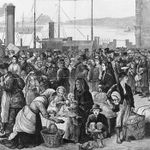100: How Roe v. Wade radically changed American culture
When Roe v. Wade was handed down by the U.S. Supreme Court in 1973, which protected a woman’s right to an abortion, “it changed everything,” says Kristin Luker, a professor emerita of law and of sociology at UC Berkeley. “It was so revolutionary — I argue it was on a par with the American Revolution or the French Revolution.”
Last Friday, the Supreme Court voted to overturn Roe, giving states broad power to curtail or end abortion. As of today, abortion is now banned in at least seven states, and about half of states across the country are expected to ban or severely restrict the procedure in the coming days.
In this Berkeley Voices episode, Luker talks about why doctors began writing anti-abortion laws in the 19th century, the experiences women had ending unwanted pregnancies in the decades before Roe v. Wade and how she doesn’t see us returning to the normative sexuality and reproduction of the 1950s.
Listen to the episode, read a transcript and see photos on news.berkeley.edu.
Follow Berkeley Voices and review us on Apple Podcasts and Spotify.
Photo by the Associated Press.
Hosted on Acast. See acast.com/privacy for more information.









